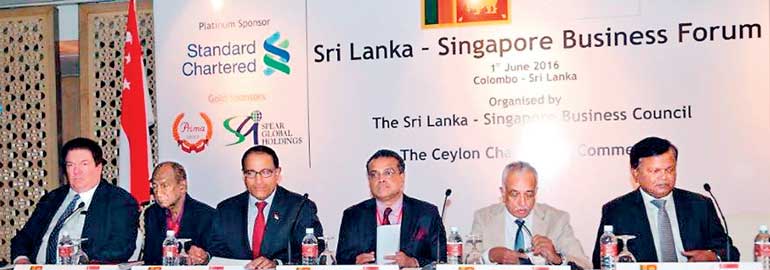Monday Feb 23, 2026
Monday Feb 23, 2026
Monday, 13 June 2016 00:00 - - {{hitsCtrl.values.hits}}

Speaking at the Sri Lanka Singapore Business Forum held recently in Colombo on 1 June, Minister of Development Strategies and International Trade Malik Samarawickrama took the opportunity to highlight the very close relations existing between Sri Lanka and Singapore. In the early 1950s Lee Kuan Yew the future Prime Minister of Singapore looked at Sri Lanka as a model for Singapore. Even in the 1960s, there had not been much difference between Sri Lanka and Singapore in terms of development but today Singapore has a GDP per capita of US$ 57,000. This is proof of Singapore’s success and there is a lot that Sri Lanka can learn from that South East Asian country.
The Minister added that in the 1970s Sri Lanka was a pioneer of liberalisation but unfortunately the country has acquired an anti-exports bias in recent years. He also said that Sri Lanka also has not attracted very much FDI when compared to South East Asian countries. Hence the policy of the Government of Sri Lanka is to develop the country to make it much more competitive.
Sri Lanka will therefore, build up its macro-economic fundamentals, and create new trade frameworks with the aim of boosting exports. In the future, efforts will be made to eliminate some of the tariffs. Sri Lanka does have many advantages such as an excellent location and excellent ports. The customs have been modernised through the introduction of ASYCUDA and the One Stop shop at the Central Customs Clearance Unit. But what is needed now is a more comprehensive system of trade agreements. A total of 50% of global trade is in fact dependent on trade agreements. Currently, Sri Lanka has such agreements with India and Pakistan and in the future it is proposed to have an agreement with China. The restoration of GSP+ with the European Union is expected later this year.
Minister Samarawickrama said that a 5-year program to increase trade and investment with the US will be launched later this year.Sri Lankan officials are working on an FTA with Singapore. ‘We can expect such measures to benefit Sri Lankan exporters and also consumers who will have access to better quality goods at low prices.’
The Singapore Company, SurbanaJurong, has developed a new Megapolis plan for Colombo. Singapore FDI is currently about $ 100 million. There is, therefore, a lot more than can be done in that respect. In addition, Sri Lanka can learn from Singapore’s excellent performance on the economic front. Of course, Singapore’s success can be attributed to the late Lee Kuan Yew. But his successors had continued to develop Singapore. Minister Samarawickrama said that President Maithripala Sirisena and Prime Minister Ranil Wickremesinghe have a great vision for Sri Lanka and will soon introduce their development plans for the country.
Minister of Trade and Investment of Singapore S Iswaran also spoke saying that Singapore has celebrated 50 years of independence, and is working towards maintaining its relevance and growth. And there are lessons to learn and to share with Sri Lanka. He added that both countries had relations that go back a long way and Ceylonese people were in Singapore from the early 1900s. Dr. Rajaratnam, who in fact had his origins in Ceylon, ended up becoming Singapore’s Deputy Prime Minister.
One of the first Companies from Singapore which invested in Sri Lanka was the Prima Group who set up their mill in Trincomalee. Many other companies from Singapore have opted to invest in Sri Lanka. Singapore had invested altogether $530 million in Sri Lanka and interestingly Sri Lankan companies have invested $120 million in Singapore. So FDI is in fact a two way process between the two countries.
Singapore companies have also changed Colombo’s Skyline. For an example, the World Trade Centre and the Bank of Ceylon Tower are both done by Singaporean companies. However, this is far from the full potential of the relations that the two countries can achieve. And in the future it is important to look at internationalisation as the basis for the future growth.
Singapore has also benefited considerably through FTAs and is connected to the ASEAN region which is growing at 5% annually: this has been benefiting all members of ASEAN. Minister Iswaran said that Prime Minister Ranil Wickremesinghe wanted an FTA with Singapore and the Singaporean side also shared this view. He also said that European Companies are increasingly looking at East Asian Markets and are keen to identify partners in Asia. This offers considerable opportunities to enterprises in both Singapore and Sri Lanka. Minister Iswaran’s visit has offered both Sri Lanka and Singapore the opportunity to look at ways of expanding the depth and breadth of their economic relations.